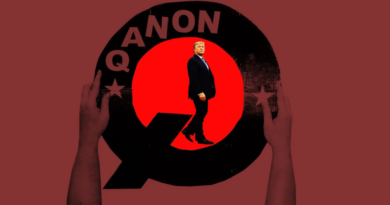‘Trump Appears To Have Gone Full QAnon,’ UMass Internet Scholar Says

More than 200 weeks into President Donald Trump’s term, and less than two weeks before his term is set to end, Facebook has made the decision to suspend the president’s page indefinitely. The move comes after yesterday’s insurrection at the U.S. Capitol. Social media has been hugely important to Trump. It’s a key way that he and his allies have circulated lies and conspiracy theories. UMass Amherst professor Ethan Zuckerman is a longtime scholar of the online world. He discussed Trump’s suspension with GBH All Things Considered host Arun Rath. This transcript has been edited for clarity.
Arun Rath: President Donald Trump has been making incendiary posts on Facebook and elsewhere throughout his time in office. Obviously what happened at the Capitol yesterday was something beyond anything that’s ever taken place so far. Does the Facebook decision make sense to you in the context of all of it?
Ethan Zuckerman: I think we’ve reached a point where Facebook really had no other choice. The video that Trump posted that basically patted the rioters on the back was such a frightening and strange moment that I think the platforms had a very reasonable argument that spreading it was an incitement to violence. I think there’s many people who would argue that Trump should have been pulled from Twitter and Facebook quite a long time ago. You can imagine, though, why deplatforming a president would be such an incredibly difficult decision for a technology company, particularly for technology companies who the president has directly threatened with increased regulation if they don’t let him say exactly what he wants to say on those platforms.
Rath: Which seems fair enough, because as journalists, we’ve also made the decision about deplatforming the president, and it’s not something you can really do lightly wherever you are. At the same time, is it cynical to think that Facebook’s decision might also have to do with the fact that Democrats will be in control of the federal governmen, that they might see some writing on the wall for regulation in their future?
Zuckerman: It was certainly not as brave a decision as it would have been before the election results came in. There is this sense of shutting the barn door well after the horse has left. But I would also say that this is part of a continuum. We started seeing some of the scariest far-right provocateurs, folks like Alex Jones, get banned from these platforms in 2018. That was a moment where Apple first, followed by Facebook and then a full month later Twitter, finally got around to taking down this hateful figure who had accused the parents of kids killed in the Sandy Hook shooting of being paid crisis actors. Then we saw the platform start to go after COVID-19 misinformation this summer and go after videos like “Plandemic” that were incredibly dangerous and telling people to stop wearing masks. So I feel like in some ways this is the next logical step in the platforms starting to take increasing responsibility for speech that they know is incendiary and they know is going to end up being dangerous.
Rath: In parts of the mainstream media that have spread some of the Trumpian misinformation — I’m thinking mainly of Fox News — we’ve seen in the last 24 hours a kind of new reckoning. Not complete, but it’s there. So I’m really curious, because you follow the Trumpian internet — what has the reaction been to what happened yesterday?
Zuckerman: I think Fox News is no longer safely part of the Trumpian internet. There are certainly commentators on Fox News who are strongly pro-Trump, but we’ve now found it’s sites like Newsmax and OAN, as well as some of the classic sites like Gateway Pundit, that are really where the truly insular “Trump can do no wrong” narrative is unfolding. I think Donald Trump and Fox News had an end to their romance when Fox, in fact, called the election, which really sort of shattered Trump’s alternate reality. If you look on Newsmax, if you look on OAN in particular, if you look on something like Infowars, you will find a mix that will explain to you that it was not, in fact, Trump supporters but Antifa masquerading as Trump supporters who committed the violence in the Capitol. That, of course, is not true. But that’s really where that sort of tight ecosystem between those platforms and these new, what I would call sort of alt far right social media platforms like Gab and Parler, where a lot of these conversations are taking place. That’s a closed universe, and terrifyingly, it seems to be a closed universe where Donald Trump is getting a lot of his information.
Rath: I have to imagine if that’s the case then with QAnon, you’re probably not seeing much reckoning there.
Zuckerman: This is the interesting thing. For many years, those of us who’ve been following QAnon, this baseless conspiracy theory that believes that a group of pedophile Democrats are secretly running a deep state, there’s been questions on whether Donald Trump was aware of QAnon, whether he was supportive of the movement. Since his loss at the polls, President Trump appears to have gone full QAnon. Essentially, the conspiracy theories that he has been amplifying about a “stolen election” are coming straight from QAnon. So that far right part of the ecosystem, further right even than Fox News, but really located around that small universe of sites and around these alternate social media platforms, that appear to be what the president is listening to. So we have this really strange phenomenon where the president is basically the cult leader for QAnon, he’s the figure of worship and veneration, and he also appears to have drunk the Kool-Aid.
*** This article has been archived for your research. The original version from wgbh.org can be found here ***


